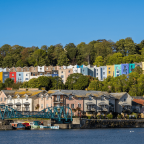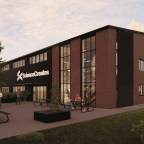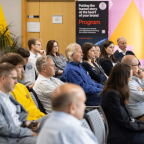
South West-based projects make global shortlist for structural engineering awards
Three engineering projects from across the South West have been featured in an international shortlist of "some of the best engineering projects the world has to offer from the past two years."
An elevated walkway in Somerset, a low-carbon community chapel in Gloucestershire, and an archive hub in Cornwall are among the works listed in the 2021 Structural Awards Shortlist, revealed this month by the Institution of Structural Engineers (IStructE). The shortlist features 53 projects across 13 categories, with projects from across the globe represented including in Singapore, London, China, Ireland, Denmark, and Australia.
The shortlist for this year's awards was selected from entries from 2020 and 2021, as the awards did not take place last year due to Covid.
The Viper, an elevated walkway in Somerset, is in contention for the Small Projects of Under £3m Award, alongside the Stroud Christian Community Chapel in Gloucestershire.
The Viper is a tree canopy walkway snaking through a forest at The Newt, a country estate with extensive gardens and woodland. The 130m-long steel structure is supported on steel piles anchored into the earth at points carefully chosen to minimise disruption to the forest floor. The judges said of the work: "The project is a charming example of how a sensitive approach and diligence during the design and construction processes can create something of enduring beauty."
Stroud Christian Community Chapel uses panels of cross-laminated timber to form a complex polyhedral form, reminiscent of traditional vaulted cathedrals. Advanced Finite Element Analysis (FEA) techniques were developed to justify the unique rib-stiffened structural shell which makes up the roof and walls. The judges said: "This project admirably met the client's brief and demonstrates an impressive simplicity of form. The Cross Laminated Timber (CLT) structural folded plates are elegantly proportioned and allow for the smooth flow of forces from the vaulted ceiling to the ground. [...] Minimalist, satisfying and good value."
Meanwhile, Cornwall's Kresen Kernow made the shortlist for Structural Heritage. According to its website, Kresen Kernow is "home to the world’s largest collection of documents, books, maps and photographs related to Cornwall’s history."
Judges said of the Redruth-based project: "The reuse and reimagining strategy focused on maintaining as much of the existing building fabric as possible within the visitor centre and teaching space. This approach balanced the significant new build of the highly technical archive space. Modern design techniques were employed to minimise operational energy in the new archive and traditional construction techniques allowed the reuse of the original cast-iron columns and facades.
"The design of the new extension meets the highest standards for storage and exhibition of archival materials. Achieving such stringent criteria in spite of the historic building setting, flood plain location and complex ground conditions, presented significant challenges to the design team. Their holistic design solution used an exposed reinforced concrete frame to create a stable internal environment and decrease reliance on mechanical intervention. "An excellent reuse project with a good balance between sympathetic repair and the creative introduction of new structure to suit a new purpose."
Established in 1968, the Structural Awards are billed as "the world's leading awards for structural engineering excellence." Winners for this year's awards will be announced in November.
Professor Tim Ibell, chair of the judging panel and professor of Structural Engineering in the University of Bath's Department of Architecture & Civil Engineering, said: “What a fantastic two-year bumper crop of shortlisted projects. Despite the pandemic, the sense of pride for our profession, which the Structural Awards always fosters, is alive and kicking and is well-reflected in this year’s shortlist.
“Sustainability is a central focus for this year’s programme. The whole judging panel was incredibly impressed with the amount of amazing projects able to demonstrate wonderful, sustainability-related innovations. The need for eco-friendly design will continue to grow in judging priorities over the coming years, as we all grapple with the exciting, but considerable, decarbonisation challenge. This year’s shortlist reflects the very first steps in this move and, as always, provides inspiration for so many across global construction.”
The full shortlist can be viewed here.







